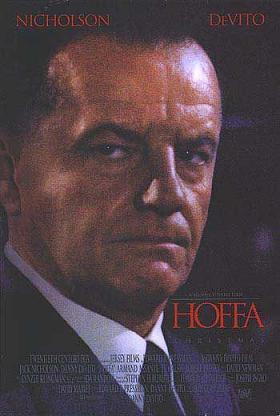Big Labor in Pop Culture Part 1: Hoffa

Hoffa is a 1992 movie about the International Brotherhood of Teamsters’ President, Jimmy Hoffa. It was directed by Danny DeVito, and Jack Nicholson played Hoffa.
The movie starts out with Jimmy Hoffa and his sidekick, Bobby Ciaro, waiting in a car outside a restaurant for something or someone. Through flashbacks, the film explains Hoffa’s character and how he operated. He was a cold, ruthless man who enjoyed power. While he occasionally talks about workers’ rights, the viewer realizes quickly that Hoffa doesn’t become president of the union because he cares about workers’ rights.
The flashbacks start with Hoffa as an organizer for Local 299 of the Teamsters in Detroit. Interestingly, Hoffa became involved in union organizing as a teenager working in a grocery store. When the grocery workers tried to organize a union, he became a leader and that started his organizing career.
The movie does not show all of Hoffa’s leadership positions: In December 1949, he became president of Local 299. Later, he led the Detroit-area locals and then became the head of the Michigan Teamsters. In 1952, Hoffa became vice-president of the national organization after he helped the Teamsters president get elected. And in 1958, he became president after his predecessor was indicted for fraud. The film does, however, show that he was passed over quite a few times before becoming president of the national organization.
While Hoffa was successful in expanding union membership, it came at a price for him due to his involvement with organized crime, and this is clearly shown in the movie.
Hoffa also explains the hatred that Robert Kennedy had for Jimmy Hoffa because Hoffa ridiculed him at a Senate Hearing. It shows how Hoffa first faced criminal investigations in 1957, but he was able to avoid conviction until Robert Kennedy was appointed Attorney General. The film also focuses on his conviction for fraud for loaning Teamsters pension funds to organized crime leaders and that he was imprisoned. However, as shown in the movie, Hoffa’s friends secured a pardon agreement with President Richard Nixon, but Hoffa was forced to resign as president of the Teamsters in 1971 and was prohibited from union organizing. Hoffa unsuccessfully tried to overturn this order.
The movie ends with Hoffa being murdered by mafia thugs after he tries to kill his successor, the Teamsters new president. This ending is a good theory as to what happened to Hoffa because he simply disappeared on July 30, 1975, from the parking lot of the Machus Red Fox Restaurant in a suburb of Detroit. His body has never been found, but he was declared dead in 1982. He was purportedly meeting two mafia leaders, Anthony Giacalone and Anthony Provenzano. Provenzano was actually vice-president of the Teamsters while Hoffa was president.
Interestingly, in large part because of Hoffa’s work of creating regional sections and a national organization for the Teamsters, membership in the union grew from 75,000 in 1903 when it was founded to a million members in 1951. His greatest achievement for the union was the 1961 National Master Freight Agreement, which unionized all over-the-road truck drivers.
The Hoffa movie did a terrific job showing Hoffa’s personality and associations. From the beginning, Hoffa uses people to get to the top. An example is when he gets Robert Ciaro, a later sidekick, fired in order to drum up union support. The movie also shows the violence that the union causes, i.e. a building is blown up and workers are killed in another scene during a strike. Finally, the mafia ties to the union are clear in this film.
The movie shows union leaders for what they are: bullies who will exploit workers in whatever manner it takes to become powerful.





